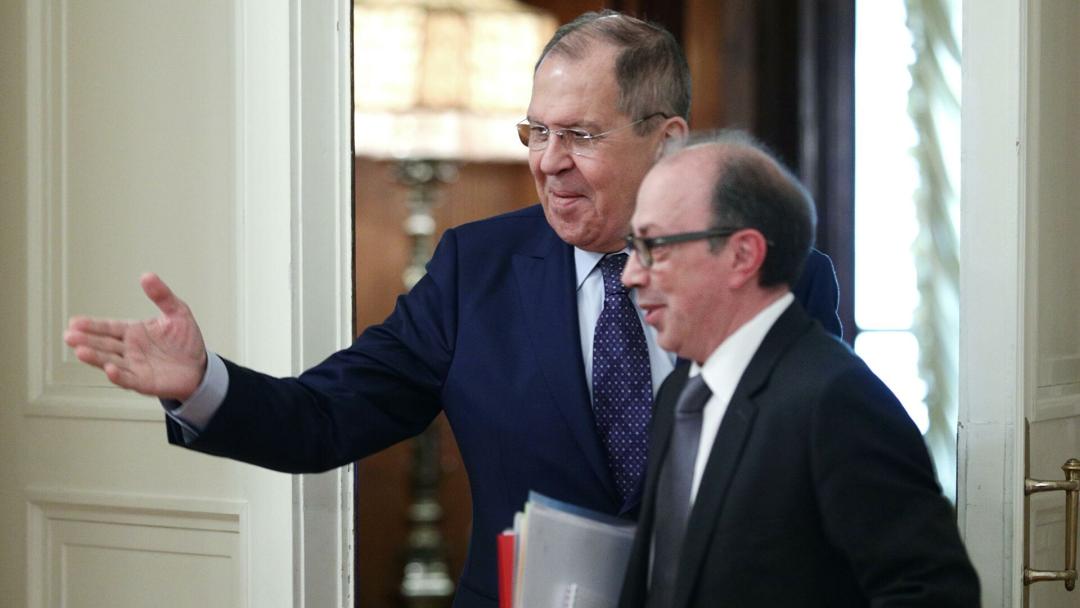
Nagorno-Karabakh: Ayvazyan and Lavrov meeting

On 7 December, the Russian Foreign Minister Sergey Lavrov met with his Armenian counterpart Ara Ayvazyan to discuss the issue of Nagorno-Karabakh.
During the meeting Lavrov stated that the South Caucasus region was turning from a region of contradictions into a region of stability, as well as that the Nagorno-Karabakh conflict was emerging from the hot phase. He recalled that to advance this goal, Russian peacekeepers were actively working in the region. Lavrov also stated that the peacekeepers contributed to the process of exchanging prisoners and returning the bodies of the dead.
In addition, Lavrov expressed Moscow’s interest in cooperation with international structures in restoring peaceful life in Nagorno-Karabakh. He emphasised that the Russian leadership made a decision to allocate an additional one-time voluntary contribution to the International Committee of the Red Cross budget, in order to tackle the humanitarian issues in the region. He also talked about the prospects related to the creation of a humanitarian response centre, which was created under the initiative of Russian President Vladimir Putin. Lavrov said that Russia plans to turn this centre into an international one and engage Armenia and Azerbaijan in the process.
Lavrov expressed his satisfaction with the observance of the ceasefire regime for almost a month, the process of returning refugees, progress in the exchange of the dead and prisoners of war, along with the search for the missing. He also stated that the process of restoring the economy, infrastructure, and health systems and life support would contribute to the establishment of good-neighbourly relations between Armenians and Azerbaijanis, both in the territory of Nagorno-Karabakh and in the interstate plan.
The Russian diplomat also commented on the statement of EU Foreign Ministers Josep Borells statement that the “astanization” of relations between Russia and Turkey allowed these countries to divide spheres of influence in Syria, Libya and the Caucasus. “I really hope that the European Union will behave in a modern way and not try to present the modern world as subject to division into spheres of influence. There will be enough room for everyone if they participate honestly in the settlement of a particular conflict, and not for the sake of obtaining some geopolitical benefits and outside advantages,” Lavrov said. He also said that France later joined the co-chairmanship of the OSCE Minsk Group and that Russia and the US agreed to this format at the request of Paris.
As for Ayvazyan, he stated that Yerevan and Baku will hold a meeting on the Karabakh issue immediately after the situation stabilises. “We look forward to the visit of the OSCE Minsk Group co-chairs to the region in the near future, as well as the start of consultations between the mediators and FM. In the future, it will be possible to prepare the ground for the start of a new negotiation process,” he added.
Ayvazyan also expressed Yerevan’s readiness to exchange prisoners of war with Azerbaijan on the principle of “all for all.” He also stated that Turkey must withdraw its military and associated militants from Nagorno-Karabakh. “There are no clear signals about the withdrawal of foreign fighters and terrorists so far. There is reliable information about Azerbaijan's plans to expand the geography of the spread of militants, terrorists, and mercenaries and resettle them to the regions of Karabakh,” Ayvazyan stated.
On the same day, Russia’s President Vladimir Putin held a phone conversation with Germany’s Chancellor Angela Merkel where they discussed the situation in Nagorno-Karabakh. Putin briefed Merkel on Russia's mediation efforts to end military operations, as well as the activities of Russian peacekeepers deployed along the line of contact and the Lachin corridor with the consent of Baku and Yerevan. The need to urgently address the problems of the population affected by the military operations was stressed. In this regard, the leaders stressed the importance of involving specialised international structures in the activities of the humanitarian centre established by Russia. Putin and Merkel agreed to continue future cooperation within the OSCE Minsk Group.
See Also


Simonyan: “Armenia Should Trade with Turkey and Azerbaijan Instead of Closing Borders”

Mirzoyan Meets US Deputy Assistant Secretary Joshua Huck

Azerbaijani President Holds Talks with UAE and German Business Delegations on Economic Cooperation

Grigoryan Confirms Armenia’s Readiness to Dissolve OSCE Minsk Group Upon Peace Treaty Signing

